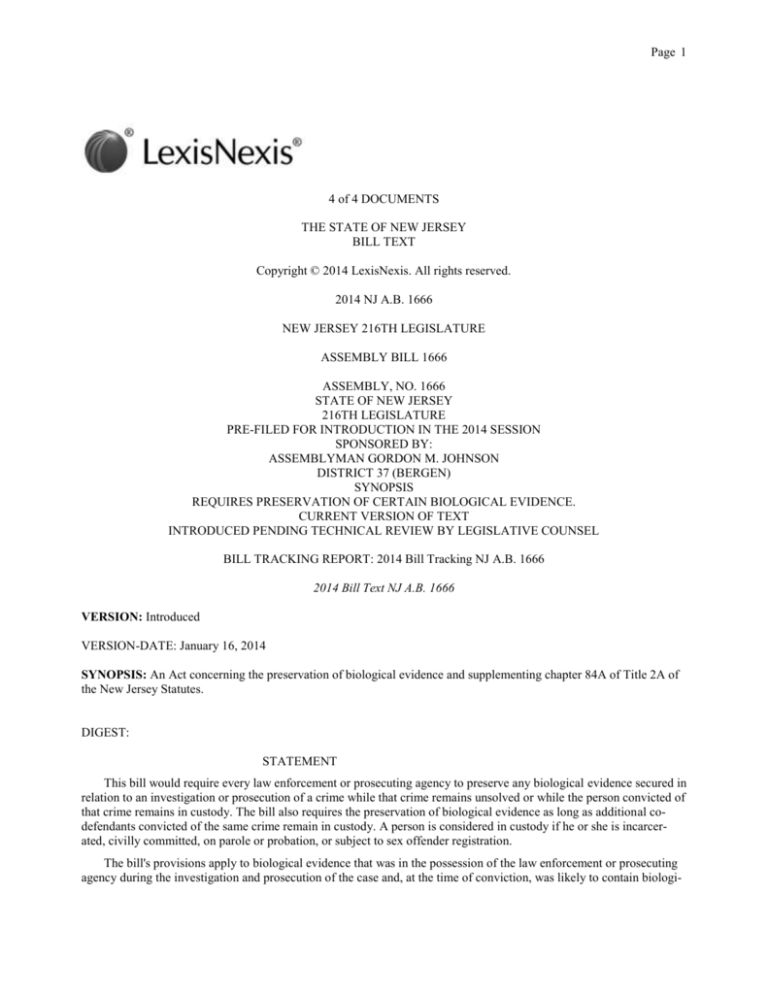
Page 1
4 of 4 DOCUMENTS
THE STATE OF NEW JERSEY
BILL TEXT
Copyright © 2014 LexisNexis. All rights reserved.
2014 NJ A.B. 1666
NEW JERSEY 216TH LEGISLATURE
ASSEMBLY BILL 1666
ASSEMBLY, NO. 1666
STATE OF NEW JERSEY
216TH LEGISLATURE
PRE-FILED FOR INTRODUCTION IN THE 2014 SESSION
SPONSORED BY:
ASSEMBLYMAN GORDON M. JOHNSON
DISTRICT 37 (BERGEN)
SYNOPSIS
REQUIRES PRESERVATION OF CERTAIN BIOLOGICAL EVIDENCE.
CURRENT VERSION OF TEXT
INTRODUCED PENDING TECHNICAL REVIEW BY LEGISLATIVE COUNSEL
BILL TRACKING REPORT: 2014 Bill Tracking NJ A.B. 1666
2014 Bill Text NJ A.B. 1666
VERSION: Introduced
VERSION-DATE: January 16, 2014
SYNOPSIS: An Act concerning the preservation of biological evidence and supplementing chapter 84A of Title 2A of
the New Jersey Statutes.
DIGEST:
STATEMENT
This bill would require every law enforcement or prosecuting agency to preserve any biological evidence secured in
relation to an investigation or prosecution of a crime while that crime remains unsolved or while the person convicted of
that crime remains in custody. The bill also requires the preservation of biological evidence as long as additional codefendants convicted of the same crime remain in custody. A person is considered in custody if he or she is incarcerated, civilly committed, on parole or probation, or subject to sex offender registration.
The bill's provisions apply to biological evidence that was in the possession of the law enforcement or prosecuting
agency during the investigation and prosecution of the case and, at the time of conviction, was likely to contain biologi-
Page 2
2014 Bill Text NJ A.B. 1666
cal material. The bill defines "biological evidence" as any item that contains blood, semen, hair, saliva, skin tissue, fingernail scrapings, bone, bodily fluids or other identifiable biological material that was collected as part of the criminal
investigation or may reasonably be used to incriminate or exculpate any person for the offense, whether this material is
catalogued separately, such as on a slide or swab or in a test tube, or is present on other evidence, including, but not limited to, clothing, ligatures, bedding or other household material, drinking cups, and cigarettes. The contents of a sexual
assault examination kit also constitutes biological evidence.
Law enforcement or prosecuting agencies are required to retain sufficient evidence to develop a DNA profile from
the biological material contained in the evidence. But they are not required to preserve physical evidence that is of such
a size, bulk, or physical character as to render retention impracticable. Under these circumstances, the agency must remove and preserve portions of the material evidence likely to contain biological evidence related to the offense, in a
quantity sufficient to permit future DNA testing before returning or disposing of the physical evidence.
Defendants may submit written requests for an inventory of biological evidence that has been preserved in connection with their cases, as well as a request in writing for a copy of that inventory.
If the agency is unable to locate biological evidence that was to be preserved, the chief evidence custodian must
provide an affidavit stipulating under penalty or perjury the efforts taken to locate that evidence and that the evidence
could not be located.
Biological evidence may be destroyed before the crime is solved or the person is released from custody under certain limited conditions if proper notice is given to the appropriate parties.
Under the bill, the Director of the Division of Criminal Justice is required to develop standards for collecting, retaining and cataloguing biological evidence; recommend practices, protocols, models, and resources for cataloguing and
accessing this evidence; and conduct training programs for law enforcement officers and other employees charged with
preserving and cataloguing the evidence.
According to the sponsor, it is crucial that biological evidence be appropriately preserved so that it can be used to
solve old crimes, enhance public safety, and settle claims of innocence.
TEXT: Be It Enacted by the Senate and General Assembly of the State of New Jersey:
1. The Legislature finds and declares that:
a. The value of properly preserved biological evidence has been enhanced by the discovery of modern DNA testing
methods, which, coupled with a comprehensive system of DNA databases that store crime scene and offender profiles,
allow law enforcement to improve its crime-solving potential;
b. Tapping the potential of preserved biological evidence requires that this evidence be properly identified, collected, preserved, stored, catalogued, and organized;
c. Law enforcement agencies indicate that "cold" case investigations are hindered by an inability to access biological evidence that was collected during criminal investigations;
d. Innocent people mistakenly convicted of serious crimes for which biological evidence is probative cannot prove
their innocence if the evidence is not accessible for testing under appropriate circumstances;
e. It is established that the failure to update policies regarding the preservation of evidence squanders valuable law
enforcement resources, manpower hours, and storage space; and
f. Simple but crucial enhancements to protocols for properly preserving biological evidence can solve old crimes,
enhance public safety, and settle claims of innocence.
2. For the purposes of this act:
"Biological evidence" means any item that contains blood, semen, hair, saliva, skin tissue, fingernail scrapings,
bone, bodily fluids or other identifiable biological material that was collected as part of the criminal investigation or
may reasonably be used to incriminate or exculpate any person for the offense, whether this material is catalogued separately, such as on a slide or swab or in a test tube, or is present on other evidence, including, but not limited to, clothing,
ligatures, bedding or other household material, drinking cups, and cigarettes; the term also shall include the contents of
a sexual assault examination kit.
Page 3
2014 Bill Text NJ A.B. 1666
"Custody" means persons currently incarcerated, civilly committed, on parole or probation, or subject to sex offender registration.
"Director" means the Director of the Division of Criminal Justice in the Department of Law and Public Safety.
"DNA" means deoxyribonucleic acid.
"Law enforcement or prosecuting agency" or "agency" means any governmental, public or private person or entity
within this State charged with the collection, storage, or retrieval of biological evidence, including, but not limited to
law enforcement agencies, prosecutors' offices, courts, public hospitals, and crime laboratories.
"Profile" means a unique identifier of a person which is derived from that person's DNA.
3. a. Every law enforcement or prosecuting agency shall preserve any biological evidence secured in relation to an
investigation or prosecution of a crime while:
(1) The crime remains unsolved; or
(2) The person convicted of that crime remains in custody.
b. The provisions of this section shall apply to biological evidence that:
(1) Was in the possession of the agency during the investigation and prosecution of the case; and
(2) At the time of conviction was likely to contain biological material.
c. The agency shall not destroy biological evidence if an additional co-defendant, convicted of the same crime, remains in custody and shall preserve this evidence while all co-defendants remain in custody.
d. The agency shall retain evidence in the amount and in a manner sufficient to develop a DNA profile from the
biological material contained in or included on the evidence.
e. Upon written request of a defendant, the agency shall prepare an inventory of biological evidence that has been
preserved in connection with the defendant's criminal case.
f. The agency may destroy evidence that includes biological material before the expiration of the time period specified in subsection a. of this section if:
(1) No other provision of federal or State law requires the agency to preserve the evidence;
(2) The agency sends certified delivery of notice of intent to destroy the evidence to:
(a) all persons who remain in custody as a result of the criminal conviction, delinquency adjudication, or commitment related to the evidence in question;
(b) the attorney of record for each person in custody;
(c) the public defender;
(d) the county prosecutor where the person was convicted; and
(e) the Attorney General; and
(3) A person notified pursuant to paragraph (2) of subsection f. of this section, within 180 days after the date of receipt of the notice, does not:
(a) file a motion for performance of forensic DNA testing under section 1 of P.L.2001 c.377 (C.2A:84A-32a); or
(b) submit a written request for retention of evidence to the agency which provided notice of its intent to destroy
evidence under paragraph (2) of subsection f. of this section.
g. If the agency receives a written request for retention of biological evidence after providing notice under paragraph (2) of subsection f. of this section of its intent to destroy that evidence, the agency shall retain the evidence while
the person remains in custody.
Page 4
2014 Bill Text NJ A.B. 1666
h. The agency shall not be required to preserve physical evidence that is of such a size, bulk, or physical character
as to render retention impracticable. When such retention is impracticable, the agency shall remove and preserve portions of the material evidence likely to contain biological evidence related to the offense, in a quantity sufficient to permit future DNA testing before returning or disposing of the physical evidence.
i. If the agency is unable to locate biological evidence that it is required to preserve under this act, the chief evidence custodian assigned to the entity charged with the preservation of the evidence shall provide an affidavit stipulating under penalty or perjury that describes the efforts taken to locate that evidence and that the evidence could not be
located.
4. The director shall:
(1) Devise standards regarding the proper collection, retention and cataloguing of biological evidence for ongoing
investigations and prosecutions;
(2) Recommend practices, protocols, models, and resources for cataloguing and accessing preserved biological evidence currently in the possession of the State; and
(3) Administer and conduct training programs for law enforcement officers and other employees charged with preserving and cataloguing biological evidence regarding the methods and procedures outlined in this act.
5. Any person who by virtue of employment, or official position, has possession of, or access to, biological evidence and destroys that evidence in violation of the provisions of this act is guilty of a disorderly person's offense.
6. The Attorney General shall promulgate guidelines and procedures governing the preservation of biological evidence as required by this act.
7. This act shall take effect on the first day of the seventh month after enactment and shall apply to biological evidence in the custody of any law enforcement or prosecuting agency on the effective date of this act.
SPONSOR: Johnson
SUBJECT: EVIDENCE (97%); LAW ENFORCEMENT (97%); DNA TESTING (95%); DNA (95%); INVESTIGATIONS (94%); VICTIMS RIGHTS (90%); LEGISLATION (82%); SHOPLIFTING (72%); SEX OFFENSES (63%);
FORENSICS (63%); FINES & PENALTIES (63%); ASSAULT & BATTERY (63%); JUSTICE DEPARTMENTS
(63%); PAROLE (63%); CRIMINAL LAW (63%); FORENSIC DNA TESTING (63%); CRIMINAL OFFENSES
(63%); SETTLEMENT & COMPROMISE (62%); LEGISLATORS (62%);
LOAD-DATE: January 18, 2014









